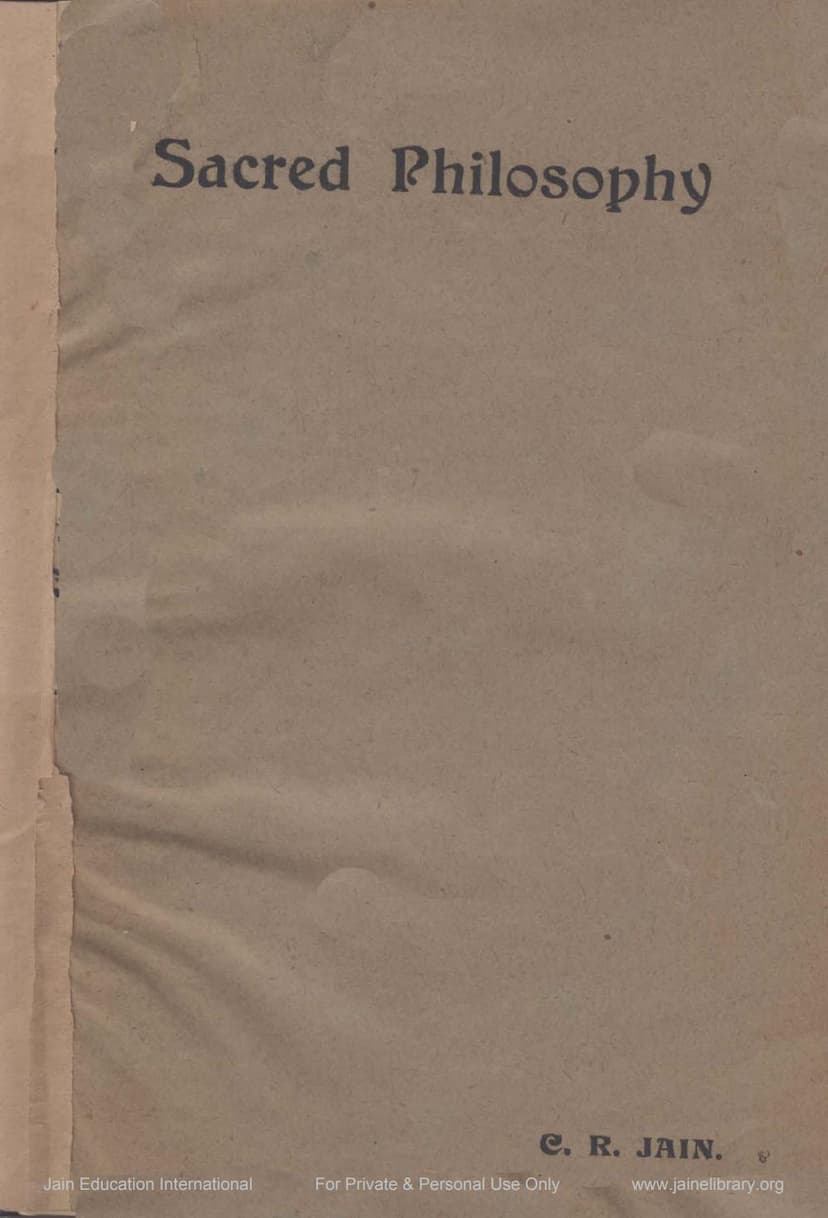Sacred Philosophy
Added to library: September 2, 2025

Summary
Here's a comprehensive summary of the provided Jain text, "Sacred Philosophy" by Champat Rai Jain:
The book, "Sacred Philosophy," by Champat Rai Jain, presents the Jaina Siddhanta, the ultimate conclusions and worldview of the Jainas. It emphasizes the indissoluble union of philosophy and rational thought, arguing that both are essential for a comprehensive understanding of reality and for achieving the highest good. Philosophy, for Jainism, is not a mere intellectual pastime but a practical process of reflecting on experience to create a consistent system that can be harnessed for human betterment.
Core Principles and Arguments:
- Philosophy's Practical Purpose: Jainism rejects philosophy for its own sake or as a tool to merely support pre-existing beliefs. Instead, it advocates for a philosophy grounded in utility and practical application for the attainment of the "highest good," which is liberation from the cycle of rebirth.
- The Nature of the World: The text challenges the common questions about the world's origin ("whence," "by whom," "when") as potentially misleading. The more pertinent question is "what is this world?" The Jaina view posits that the world is eternal, not created at a specific point in time. The concept of an absolute beginning or end is deemed impossible to rationally conceive.
- Substance and Change: The Jaina understanding of substance is crucial. It is defined as that which possesses origination, destruction, and continuance simultaneously. This means that while the modes or attributes of a substance change, the underlying substance remains constant. This counters theories of impermanence, aligning with modern scientific principles like the conservation of matter and energy. Examples like melting gold illustrate this concept – the "bar-ness" is destroyed, a molten state originates, but the gold itself continues.
- Rejection of a Creator God: The book systematically refutes the notion of a creator deity. Arguments include:
- Lack of Physical Interaction: A creator described as pure spirit (effulgence) without hands or feet cannot physically interact with material substances to shape the world.
- Unintelligent Matter: Raw material in nature does not obey mere commands or decrees. Intelligence is required for a command to be effective, and material substances do not possess this in themselves prior to the action of a conscious being.
- Self-Functioning of Substances: Substances have their own inherent properties and functions. The supposed need for divine command to perform these functions is illogical, as a substance cannot simultaneously exist and not exist in order to await a command. Natural law, arising from the inherent attributes and functions of substances, is sufficient to explain the world's order.
- Argument from Design: The perceived harmony in nature, such as the coordination of bodily organs, is explained not by a designer, but by the inherent chemical properties of substances allowing them to form themselves appropriately. The idea of a divine being creating "unsightly" things like saliva and feces is also presented as blasphemous.
- The Six Substances: Jainism identifies six fundamental, eternal substances:
- Jiva (Spirit/Soul): Characterized by awareness, knowledge, and perception. It is distinct from matter.
- Ajiva (Non-spirit): This category includes:
- Pudgala (Matter): The physical substance.
- Akasha (Space): The medium for the existence of other substances.
- Kala (Time): The cause of change.
- Two kinds of Ether (Dharmastikaaya and Adharmastikaaya): The principles that facilitate motion and rest, respectively.
- The Nature of the Soul (Jiva):
- Consciousness: The soul is fundamentally conscious, possessing knowledge and perception. This consciousness is an intrinsic property of the soul-substance and not a mere byproduct of matter or brain activity.
- Independence from the Brain: The book argues against materialistic explanations that consciousness is merely a product of the brain. It highlights logical inference as an example of consciousness acting as a unified entity, not merely a collection of atomic functions. Memory and the soul's pervasive presence throughout the body also support its independence from physical matter.
- Potential Divinity: Every soul is inherently omniscient, blissful, and immortal in its pure state. This pure spirit is termed Paramatman (God). The goal of religion is to enable the soul to achieve this Godhood through purification.
- The Role of Matter: While the soul is distinct, it can become associated with matter, leading to an impure state. This association obscures the soul's natural properties.
- The Problem of Impurity and Rebirth:
- Karmic Influence: The soul's inability to manifest its full potential (omniscience, bliss, immortality) is due to the influence of Karmic matter. This matter is generated by the soul's desires and actions.
- Influx of Matter: Every action (physical, mental, vocal) leads to an influx of material particles that combine with the soul, influenced by desires. Attention and desire are key factors in this fusion.
- Transmigration: When the physical body dies, subtle material bodies (karmic and electric matter) cause the soul to be attracted to a new womb, perpetuating the cycle of birth and death (transmigration). The conditions and form of future lives are determined by past karmas and tendencies.
- The Path to Salvation: The ultimate goal is Nirvana, which is achieved by eradicating desires and thus preventing the influx of karmic matter. This allows the soul to shed all material impurities and reside in its pure, natural state of omniscience, bliss, and immortality.
- Ethical Imperatives: The book strongly advocates for Ahimsa (non-injury), particularly condemning the consumption of flesh as a direct violation of this principle and a cause of great suffering for the soul. Renunciation of desires is presented as the key to liberation.
In essence, "Sacred Philosophy" lays out the Jaina understanding of reality, emphasizing a rational, practical, and soul-centric approach to existence. It seeks to elevate humanity from its current limited state to its inherent divine potential through self-knowledge, ethical conduct, and the eradication of desires.